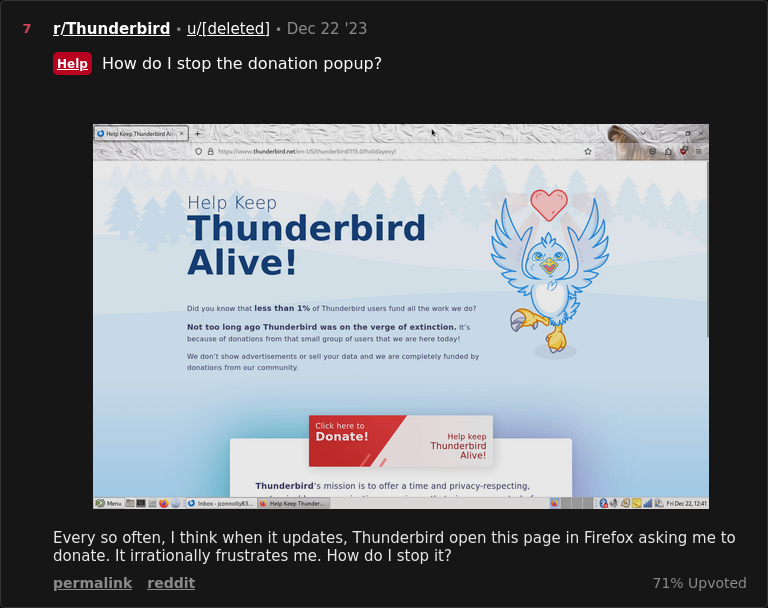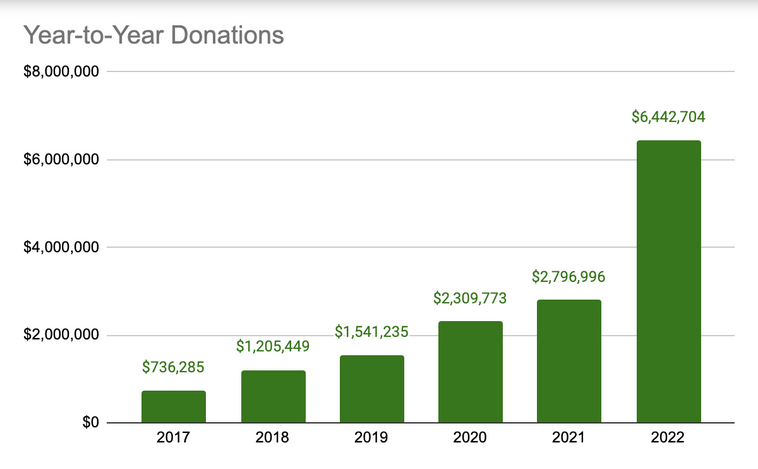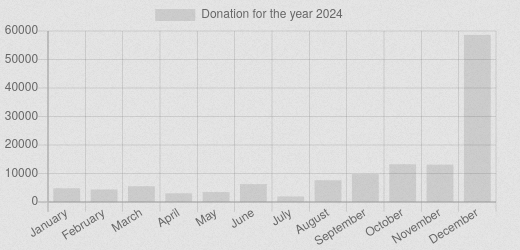Free Software Developers Need To Ask For Money
Published
Free software projects are often lacking in financial resources, and despite their dire situation, are often hesitant to directly ask for money. More often than not, projects will provide options for people to donate money. The issue is that it is done very passively and donation information is rarely advertised.
Many projects will place information about how people can donate at the bottom of their README or hidden somewhere in their application. According to the Nielsen Norman Group, 57% of people in 2018 only spend their time above the fold. Just considering the README, having the donation information placed at the bottom can mean more than half of your users will never see that information. That figure is worsened by the fact that a README's target audience is typically not for the average user as many of them are part of a project's repository.
Why Does This Matter?
Open source (free software) projects are often underfunded and understaffed, even when they are critical pieces of software. Organizations rallying to fund projects after incidents such as Heartbleed (2014) demonstrates a strong reluctance to respectfully pay for the software they rely on until they are incentivised to do so.
Unfortunately, this rally back then did not address the larger systematic issue of critical software funding. The Log4j vulnerability (Log4Shell, 2021) once again highlighted the software industry's reluctance to fund critical software.
Hesitation
Asking people for money directly is typically seen as rude so people feel uncomfortable about doing it to help sustain their projects. There's also the thought that it will create friction to the users, and it's true that actively asking to donate may annoy a few users.

Regarding the terms free software, FOSS (Free and Open Source Software), or FLOSS (Free/Libre and Open Source Software), "free" refers to liberty and not cost or price of the software.
If you prefer to give it away for free (gratis), that is up to you.
However, there's data to suggest that active and prominent callouts or notifications do work and do not cause significant friction.
Case Studies
Thunderbird
Thunderbird saw a big increase in the donations they received (2022) when they started notifying people to donate. They went from about 2.8 million dollars in 2021 to about 6.4 million dollars in 2022 in donations. That's more than double the amount from the prvious year!

We also attribute this amazing uplift to the release of Thunderbird 102, as well as a first-of-its-kind, in-app donation appeal at the end of year.
In short, we learned that projects like ours can benefit greatly from simply asking for donations, while simultaneously explaining how those donations will benefit the project – and ultimately, how they will benefit you.
Regarding the donation notification, it only occurs once a year and does not appear to the user again until the following year, regardless of what action they take. It is a considerate design choice that puts the donation information front and center without forcing the user to go through hoops to dismiss and suppress it.
KDE
KDE merged a change to ask for donations in 2024. They implemented it with thoughtful design to minimize friction, while still making it effective.
Other popular software-based nonprofits such as Thunderbird and Wikimedia ask for donations yearly in the UI of their software, and see huge returns from it. Accordingly, this commit implements a yearly system notification in Plasma that asks the user to make a donation. It's shown once in December, and then won't appear again for a year.
Confusion and frustration is expected among some users, however, the data currently shows that their callout is very effective. Donations jumped from 10000 Euros in December 2023 to over 50000 (as of 6 December).

Keep in mind that there's still the rest of this month to go and it is reasonable to expect people to continue to donate to the project.
Further Reading
- Nate Graham has a post that looked at the current success of the donation notification:
- Nicco Loves Linux video, where they look at Thunderbird and how they strenghtened their organization and community:
- Brodie Robertson video analyses the importance of donation visibility:
Conclusion
It is necessary to have projects funded so that developers can continue to work on the software they maintain. A lack of funding may cause vulnerabilities to go unaddressed or, even worse, may result in developers abandoning their projects. There is a lot of money available in the free software world, however, much of it is left on the table, which is a shame because it means projects' development speed is slowed or at risk of being abandoned. Prominent callouts to encourage people to donate has evidence to suggest it does work and doesn't appear to cause significant friction among users if it is implemented in a noticeable, but non-intrusive manner, that is easy to dismiss.
If you have not donated money to your favorite software projects, please consider doing so! A humble contribution can add up to a sizeable amount when enough people participate.